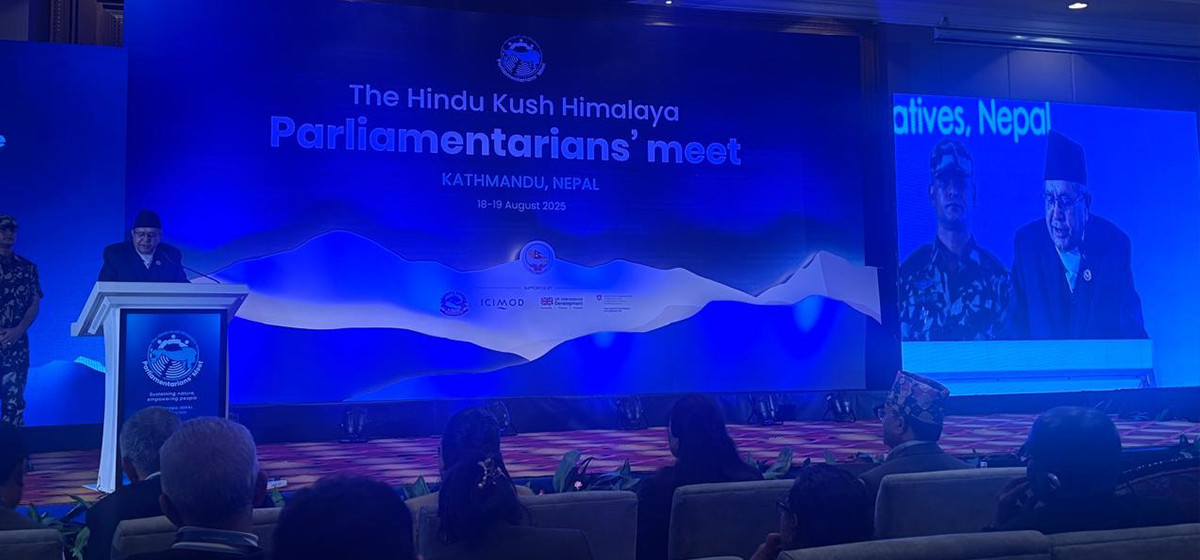KATHMANDU, Aug 20: A two-day conference of parliamentarians from the Hindu Kush Himalayan region concluded in Kathmandu on Tuesday with a commitment to create a joint parliamentary platform to address the climate crisis and other shared environmental challenges.
The first-ever conference, held under the theme “Protecting Nature, Empowering People,” brought together lawmakers and representatives from Nepal, Bangladesh, Myanmar, Pakistan, and Bhutan. The participants issued a five-point declaration calling for regular regional meetings of parliamentarians, greater cooperation in climate governance, and stronger legislative roles in drafting climate-resilient policies.
The declaration also emphasized the exchange of scientific evidence, experiences, and best practices related to climate change, biodiversity, and air quality. It pledged to strengthen parliamentary oversight to ensure accountability and support climate adaptation, while leaving the date and venue of the second conference to mutual agreement among members.
SHIFT for Our Planet: Youths urge authorities to make climate j...

Addressing the closing session, Speaker of the House of Representatives Dev Raj Ghimire underlined the urgency of collective action. Citing recent floods in India, Pakistan, Nepal, and China, as well as droughts in Nepal’s southern plains, he said such disasters highlight the region’s vulnerability. “Even if we are not scientists or engineers, as parliamentarians we can enact laws, pass budgets for adaptation, hold polluters accountable, and advocate for farmers and communities,” he said.
Kusum Devi Thapa, chair of the Agriculture, Cooperative and Natural Resources Committee of Nepal’s Federal Parliament—the host of the event—said the conference marked an important first step. “Active engagement of lawmakers will be crucial in addressing the environmental problems of the Hindu Kush Himalayan region. This is the beginning of a long journey,” she noted.
No representation from India and China
The Hindu Kush Himalayan region spans eight countries—Afghanistan, Bangladesh, Bhutan, China, India, Myanmar, Nepal, and Pakistan. However, the Kathmandu meeting was notable for the absence of India and China, the region’s two largest states.
Although Indian parliamentarian Sujit Kumar and a Chinese delegate were scheduled to speak at the opening session, both failed to attend. Several speakers expressed concern, stressing that meaningful progress would be difficult without the participation of these two key players.
Debapriya Bhattacharya, former Permanent Representative of Bangladesh to the United Nations, said India and China’s involvement was essential. “We all know that, in terms of climate, India and China are like the ‘elephants in the room’—visible to everyone but too often ignored. Their parliamentarians must be part of this dialogue. Nepal could play a strategic role in fostering such engagement,” he said.
Pemra Gyamtso, Director General of ICIMOD, the intergovernmental body supporting the conference, said both countries had initially confirmed participation but withdrew at the last moment for unspecified reasons. “Their absence should not slow down efforts for regional cooperation,” he said.
Munazza Hassan, Chair of Pakistan’s Parliamentary Standing Committee on Climate Change, echoed the need for inclusivity. “We must rise above our differences to tackle this shared challenge. To fight the climate crisis, open discussions with all regional stakeholders are essential,” she said.





































